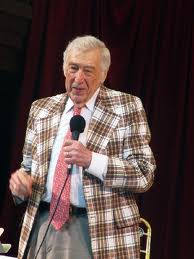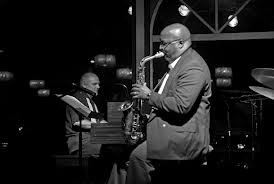It was a big deal in Stockton, CA last Friday, when Wynton Marsalis led his Jazz at Lincoln Center Orchestra at the 12th annual jazz festival produced by the Brubeck Institute at University of the Pacific.  The ticket holders’ line to enter the nicely restored Fox movie palace — now the Bob Hope Theatre, in the center of otherwise near-dead downtown — stretched around the block. The marquee was bright, and under it flowed well-dressed attendees of nearly all ages and many colors, quite festive mere days before they’d hear whether their city could enter bankruptcy. Stockton’s had the highest foreclosure rate in the country after the 2008 mortgage crisis, city services have been cut back, residents have fled, poverty’s become noticeable, crime’s on the rise . . .
But it was a clear, promising spring night, and all worries were suspended. Dave Brubeck, the iconic jazz pianist/composer/bandleader who died last December at age 91, grew up on a ranch outside Stockton, attended the school when it was still called College of the Pacific, met his wife Iola at the campus (a wall plaque commemorates the occasion), and personified the kind of can-do, confidently outgoing spirit we like to think of as quintessentially American. People in Stockton don’t give up, they hunker down. Wynton Marsalis is possessed of that, too — accepting the challenges and responsibilities of being an artist in the limelight, almost always being on, making time everywhere for extra events like the hour-long public question-and-answer session he did here with honors students who he addressed spontaneously, candidly, seemed to personally enjoy. His concert with the Orchestra, the last stop of a six-week tour, was hallmarked by other qualities Brubeck shared and would have admired: integrity, virtuosity, direct address plus a measure of daring.
Dave Brubeck was a largely self-taught proponent of jazz that engaged minds as well as bodies (swinging in odd meters, for one thing). He embraced civil rights (purposefully leading an integrated quartet through the segregated south), helped erase the lines separating  jazz from “serious” music, and reached across international boundaries (frequently on State Department tours, he played for Reagan and Gorbachev when they negotiated the INF treaty that cut back nuclear arms in the late 1980s). He co-composed and recorded at least two of the most enduring, instantly recognizable  jazz instrumentals — “Take Five” and “Blue Rondo a la Turk” — ever. Wynton Marsalis is a Juilliard-trained and Art Blakey-mentored Pulitzer Prize-winning composer and founder of America’s most prominent and arguably productive all-purpose jazz establishment, a CBS News correspondent and familiar figure at the White House among other ceremonial sites. He specializes in taut trumpet phraseology, ingenious melody twists, lip smears, mute work and other vocalisms during his well-placed solos, directing but not showboating during long sets that feature originals by his younger bandmembers as well as classics from jazz masters past.
In Stockton, “Blue Rondo” was performed in an arrangement by 30-year-old trombonist Chris Crenshaw that took full advantage of the fast-paced line’s trills and rills, breaking for a solo with suitably Middle Eastern references by alto saxophonist Walter Blanding, Jr. Other particularly strong statements came from trumpeter Kenny Rampton, alto saxophonists Sherman Irby and Ted Nash, pianist Dan Zimmer and bassist Carlos Henriquez. From the band’s enormous book of charts, Marsalis also choose complex, balanced, stylistically-appropriate versions of Duke Ellington’s “Symphonette,” Thelonious Monk’s “Light Blue,” Chick Corea’s “Windows,” Eddie Jefferson’s “Moody’s Mood for Love” and Brubeck’s “In Your Own Sweet Way.”
Marsalis and the LCJO were climactic — earning a standing O, inspiring happy buzz at a post-show reception jammed with the Brubeck Institute’s loyalist local supporters — but the Institute, which has a mission of using music for “Impacting society through the arts . . . [s]erving as a Catalyst for Social Change” built up to it with lectures by eminent (yet down-to-earth) composer-educator Gunther Schuller, 87 and a longtime Brubeck friend; gigs at the Take Five club by resident players (including the Institute’s executive director, deft pianist Simon Rowe); an intense, smokily lyrical concert by trumpeter Tom Harrell’s quintet, and experiments with street fairs that offered low-key showcases free to all comers. A fest partnership with San Joaquin Delta College resulted in a reception at an art gallery exhibit of jazz-related paintings and sculpture. A tasty Syrah and ballyhooed Zinfandel from nearby Lodi vineyards were served.
The night after Wynton, Brubeck’s longtime manager Russell Gloyd conducted his San Francisco Choral Artists and the Institute’s Brubeck fellows (studying on full scholarship) in a performance of Dave’s sacred but non-sectarian songs, followed by Dave’s sons Chris, on trombone and electric bass, and Dan, a powerful drummer, upholding their proud family name with an easily enjoyable, upbeat quartet set. At that event a new scholarship was announced in the name of their mother Iola  — Dave’s seemingly serene, elegant widow, very much in presence. Three journalists brought in to see all this (author/educator Ashley Kahn, presenter-broadcaster-author-blogger-educator Willard Jenkins, and me) were also treated to an introductory tour of the Brubeck Collection, a treasure trove of professional and personal papers, ephemera, audio documents and videos getting first class preservation and online access treatment. The U of Pacific library has the archives of Paul Desmond, Brubeck’s complementary alto saxophonist, and the archives of naturalist John Muir, too.
The Brubeck Institute has a very small staff. Besides Simon Rowe, whose resumé charts an Australian-born pilgrim’s progress of steps between small but significant jazz ed programs, there is only associate director/guitarist/educator Nick Fryer and do-everything staffer Melissa Riley. Which proves how much impact a focused cadre can have on a city’s core culture.
Both Simon and Nick played at Take Five, a bustling ex-banquet room that the Brubeck Institute gave birth to, but they were not alone. Alto saxophonist Patrick Langham (director of U of P’s Jazz Studies program) was another Take Five leader; singer Janiece Jaffe, a friend of Rowe’s from Indiana, was scheduled one night and sat in on another, gamely improvising a song out of three random words supplied upon request from the audience); pianist Joe Gilman, a Brubeck Institute artist-in-residence, led students in his commissioned suite based on Norman Rockwell’s paintings of “The Four Freedoms,” and drummer Brian Kendrick, jazz studies faculty at San Joaquin Delta was there regularly. The Stockton schools may be generating much of the Stockton jazz scene — a knowledgeable observer estimated 1/3 of the sell-out crowd for Wynton at Bob Hope Theatre had driven up for the event from the Bay Area — but what’s wrong with that? There was nothing particularly academic about the music going on, and the people listening, eating, drinking, schmoozing and flirting at Take Five could have been anywhere jazz is played. Indeed, that’s the Brubeck Institute’s point, derived from its hero’s own experience: Jazz is right for people everywhere. When the bank account is low, the heart is aching and/or times turn odd, jazz — which I’m guessing Wynton Marsalis might agree is personal expression that expands on deservedly-respected traditions of blues and swing — is a balm, a spark, an idea maybe leading to a new answer. “Take Five,” for example. No jive.


